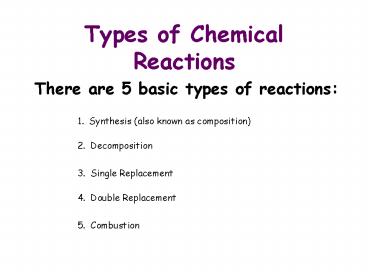Types of Chemical Reactions
1 / 12
Title: Types of Chemical Reactions
1
Types of Chemical Reactions
There are 5 basic types of reactions
1. Synthesis (also known as composition)
2. Decomposition
3. Single Replacement
4. Double Replacement
5. Combustion
2
Synthesis Reactions
-also known as a composition reaction
-two or more substances combine to form a new
compound
-LIKE A MARRIAGE
General Form A X ? AX
3
Reactions of Elements with Oxygen and Sulfur
-most metals react with oxygen to form oxides
-most metals react with sulfur to form sulfides
-multivalent metals can produce more than one
oxide
-nonmetals also react with oxygen to form oxides
4
Reactions of Metals with Halogens
-halogens undergo synthesis with many different
metals
-fluorine is so reactive that it combines with
almost all metals
5
Synthesis Reactions with Oxides
-oxides of active metals (Groups 1 and 2) react
with water to produce metal hydroxides
-oxides of nonmetals in the upper right portion
of the periodic table react with water to produce
oxyacids
-certain metal oxides and nonmetal oxides react
with each other in synthesis reactions to form
salts
6
Decomposition Reactions
-means break apart
-a single compound undergoes a reaction that
produces two or more simpler substances
-energy must be added to produce the reaction (in
the form of heat or electricity)
-LIKE A DIVORCE
General Form AX ? A X
7
Decomposition of Binary Compounds
-simplest kind separation into compounds
elements
Electrolysis
-decomposition of a substance by an electric
current
Decomposition of Metal Carbonates
-breaks down to produce a metal oxide and carbon
dioxide gas
8
Decomposition of Metal Hydroxides
-all metal hydroxides (except those of Group 1)
decompose to yield metal oxides and water.
Decomposition of Metal Chlorates
-decompose to produce a metal chloride and oxygen
Decomposition of Acids
-certain acids decompose into nonmetal oxides and
water
9
Single-Replacement Reactions
-also known as displacement reactions
-one element replaces a similar element in a
compound (cation replaces cation or anion
replaces anion)
-require much less energy than decomposition
-LIKE A LOVE TRIANGLE
General Form A BX ? AX B Y BX
? BY X
10
Double-Replacement Reactions
Definition a reaction in which the ions of 2
compounds exchange places in aqueous (water)
solution to produce 2 new compounds.
General Form
AX BY ? BX AY
This is like Do-Si-Do or Changing Partners
11
What happens?
The products of a double-replacement reaction can
be
These are solids that form when solutes react to
form insoluble products.
-a precipitate
These gases are not soluble and leave the
solution (bubbles).
-a gas
12
-water
Water molecules that are formed join the solvent.
-or spectator ions
These ions remain separated in solution and dont
participate in the reaction.
If none of the above occur, no reaction (NR)
takes place (all ions are spectators).
http//www.marymount.k12.ny.us/marynet/stwbwk05/05
flashchem/kereaction/reaction.html

